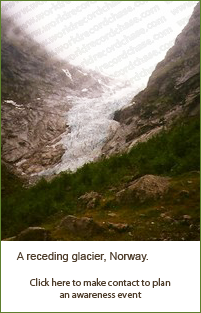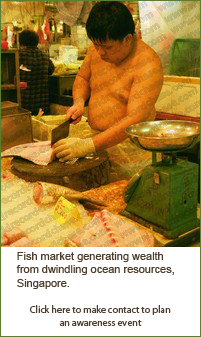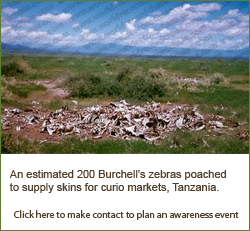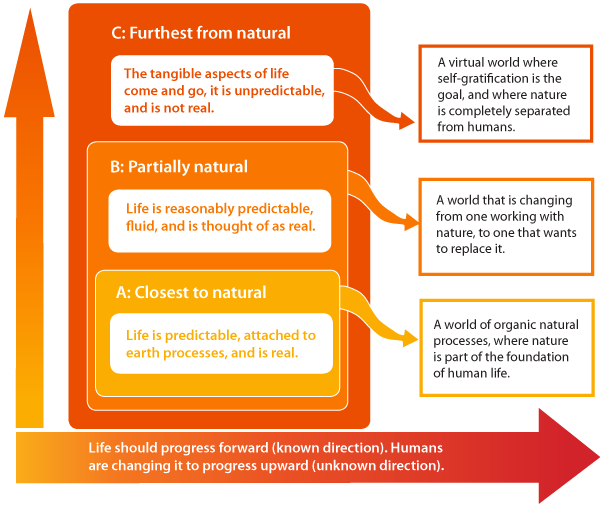Alastair Galpin
took to world record-breaking in
2004 after being inspired by a record-setting rally
driver in Kenya. What began as a hobby soon escalated
into an active publicity pursuit. Today, he promotes the
work of social and environmental causes. For these
purposes, the most fitting game plans are chosen; then
world titles are attempted and frequently created.
Good cause of the month

Elephants For Africa, Botswana, is dedicated to elephant conservation through research and education.
Sustaining sponsor
If you would like regular exposure from Alastair's activities, become his Sustaining Sponsor:
- A range of attempts annually
- Your brand in multiple media
- Distribute your own media releases
- Receive product endorsements
More details about sponsorship opportunities
Pass on your air miles
Have you got unwanted air miles?
By donating them to Alastair, you'll enable him
to attempt records in new parts of the world!
Equipment for hire
Contact Alastair if you would like to hire equipment left after attempting world records.
Special thanks
|
Behind every world record attempt is the expertise of professionals in their field. Their success underpins Alastair's. |
| They are listed here |
How To Be A Successful Record Breaker
Your Opinion?
There seem to be plenty of folk who really want to know this, because I keep getting asked. I could write a compact step-by-step booklet with plenty of visuals, that would include:
- Secrets which took me to #2 worldwide during the previous decade
- Brainstorming, finding the right team, and gathering media interest
- Tips to get active support from people who wouldn't otherwise get involved
- Fast clever ways to analyse the benefits associated with potential records
- Optimal balances between fun and commitment, useful milestone indicators and more...
The booklet would be download-able for a small payment.
Would you be a potential customer? Email me!
Filmmakers' saying
You can have it cheap, fast or good.
Pick two...
– It can be cheap and fast, but it won't be good.
– It can be cheap and good, but it won't be fast.
– It can be good and fast, but it won't be cheap.
What people say about Alastair...
Alastair Galpin is crazy about conservation, crazy about world records and crazy enough to do (almost) anything – this is a unique way to support your environmental cause.
Alastair cares about people, and the energy he puts into raising awareness of deprivation and injustice is admired. The Great Global Pokie Drop record-breaking stunt (four pokies/slots dropped from over 1000 ft from a helicopter into a rubbish tip), was a great global success.
Opinion piece
Really serious… only for the brave.
Grim, and certainly possible. But not I think inevitable - Professor Noam Chomsky, 2012
 You’ve landed in the right place if you love nature. I do. And I’m using my creative side to do something about what I feel. If you’re planning an awareness event, please contact me – it’s what I do.
You’ve landed in the right place if you love nature. I do. And I’m using my creative side to do something about what I feel. If you’re planning an awareness event, please contact me – it’s what I do.
Visitors to my website know that I’m environmentally conscious. You’d have read about ecological awareness matters in my world record stories, and seen me blogging the same stuff. Sometimes, though, it can be difficult to understand why some people link environmental messages to an awful lot of things.
In my case, what have my world record attempts got to do with ecological collapse? I use my activities to educate and entertain. If people are voluntarily watching my quirky acts, they’ll be learning from the associated messages. It’s a powerful – albeit sometimes initially unnoticed – formula, used by marketers and publicity agents. If your company is working towards improving credibility regarding sustainability issues, make contact. Let’s investigate possibilities, from recycling programmes to using sustainably harvested materials and more.
 To a growing number of experts, the way most people live is raising alarm. We’re generally using much more than what’s available out there, which is causing ‘supply chain’ problems between what the earth can produce, and what we demand from it. Whether a group of friends are attempting a world record or chasing any other dream, we all face the same choice: to act wastefully or to act responsibly. Through my stunts, I demonstrate responsible project management, because we all know youngsters learn by example.
To a growing number of experts, the way most people live is raising alarm. We’re generally using much more than what’s available out there, which is causing ‘supply chain’ problems between what the earth can produce, and what we demand from it. Whether a group of friends are attempting a world record or chasing any other dream, we all face the same choice: to act wastefully or to act responsibly. Through my stunts, I demonstrate responsible project management, because we all know youngsters learn by example.
Hoping to change peoples’ ways is a tough call because nobody likes change forced onto them. In my case, I just want to be left to do what I like doing, either for pleasure or when collaborating with organisations wanting public exposure for their efforts. Even so, I’ve learned that we’re connected to nature, and for any chance of long-term survival we need to live like a friend of the earth.
 So, I apply what sustainable living principles I can while enjoying my world record-breaking. And that’s why you don’t see me trying excessively wasteful projects – the earth isn’t strong enough to cope. As an aspiring good citizen of the world, I’d like you to join me and the millions of others who want to live at peace with nature as much as we can. Why not make contact to discuss how we could bring your environmental awareness project some exposure?
So, I apply what sustainable living principles I can while enjoying my world record-breaking. And that’s why you don’t see me trying excessively wasteful projects – the earth isn’t strong enough to cope. As an aspiring good citizen of the world, I’d like you to join me and the millions of others who want to live at peace with nature as much as we can. Why not make contact to discuss how we could bring your environmental awareness project some exposure?
Believe it or not, I do dream about stuff apart from world records and the media attention it brings. Below is an ‘opinion piece’ – these are my thoughts on the state of the earth. It’s a really serious read only for the brave of mind. I think about this as I plan and make world record attempts. I ponder these things while negotiating with potential clients from around the world, no matter how large or small their project with me may be. But even though I include eco-conscious planning in my antics, it doesn’t get in the way of a fun time!
So get out there and break as many world records as you can, get me along to entertain you, and be the best you can be. But always remember that the earth keeps us alive. Respect it.
"Mankind has moved so far out of sync with natural cycles that our extinction may be close"
- This is my personal opinion
- It is a biased view
- It is based on what I observe
(If you think the title’s a radical statement, confirm this widely held view by reading a website such as Population Matters, which Sir David Attenborough supports).
The way humans apply our consciousness is our ultimate driver, and it underlies the contemporary state of human beings – the architects of ecological decline planet-wide. I have called my observation the Human Application of Consciousness.
 The root issue behind my concern is how humans apply our consciousness. We have learned to apply it for creating favourable outcomes. Whether consciously or unconsciously, humans invest effort in searching for answers: Why am I here? What should my relationship with my surroundings be? What can I do to make this interaction as good as possible?
The root issue behind my concern is how humans apply our consciousness. We have learned to apply it for creating favourable outcomes. Whether consciously or unconsciously, humans invest effort in searching for answers: Why am I here? What should my relationship with my surroundings be? What can I do to make this interaction as good as possible?
The way humans apply our own consciousness, from surface level to the deepest levels, explains why much of human activity on earth has developed into its present state. The Human Application of Consciousness has positive impacts, including the widespread and diverse ways in which people help each other, although this piece focuses on its more numerous negative ones.
 It seems most issues relating to the Human Application of Consciousness revolve around global population. For instance, applying consciousness makes women think “it’s my human right to have a child – only one; it won’t make any difference”, and thereby populate the globe. The scientific community generally agrees that the human population cannot continue increasing at its current rate. But since reducing our population is not an option to most, we are effectively wasting energy and resources in a determined fight to pin-point a way of allowing indefinite human expansion and resource use, while the limitations and solution are evident.
It seems most issues relating to the Human Application of Consciousness revolve around global population. For instance, applying consciousness makes women think “it’s my human right to have a child – only one; it won’t make any difference”, and thereby populate the globe. The scientific community generally agrees that the human population cannot continue increasing at its current rate. But since reducing our population is not an option to most, we are effectively wasting energy and resources in a determined fight to pin-point a way of allowing indefinite human expansion and resource use, while the limitations and solution are evident.
Humans’ stubborn adherence to entrenched values, which prioritises our welfare at any cost, is forcing life down a narrow, fault-prone trajectory. Our refusal to accept this is the wrong way forward is evident by our prominent “party now, die later” attitude.
 There is enough awareness to challenge the status quo, although the dominant thinking forcibly justifies itself through lavish displays of reassurance to the public. Without a consolidated movement to slow the trend or steer it off its current course, society will continue apprehensively down the path of supposed endless development and accompanying pollution. Many will be dragged along, helplessly, and may not ever know why this has to be the status quo. Short-term gratification we receive will continue to push society beyond the warning signs of imminent collapse – such as shrinking food and fresh water supplies, and the worldwide “party” will almost certainly accelerate itself into complete destruction.
There is enough awareness to challenge the status quo, although the dominant thinking forcibly justifies itself through lavish displays of reassurance to the public. Without a consolidated movement to slow the trend or steer it off its current course, society will continue apprehensively down the path of supposed endless development and accompanying pollution. Many will be dragged along, helplessly, and may not ever know why this has to be the status quo. Short-term gratification we receive will continue to push society beyond the warning signs of imminent collapse – such as shrinking food and fresh water supplies, and the worldwide “party” will almost certainly accelerate itself into complete destruction.
 We welcome innovation to tap every possible means of enabling our systems to persist. It appears the “need to feel worthy” is a key driver in fuelling wasteful and senseless consumerism by using dwindling fossil fuels ever-faster, which is an apocalyptic catalyst. We continue to deny our dance with disaster.
We welcome innovation to tap every possible means of enabling our systems to persist. It appears the “need to feel worthy” is a key driver in fuelling wasteful and senseless consumerism by using dwindling fossil fuels ever-faster, which is an apocalyptic catalyst. We continue to deny our dance with disaster.
Modern society has lost touch with the prime reasons for living. The way we see life is symptomatic of our modern warped mentality. Instead of learning from nature, our priorities are to enslave, modify and destroy it. Through history, even those among the wisest of governors have flailed in such pursuits.
Along with a modified sense of what should be normal, we have largely lost our depth of meaning.
 In the distant past, the meaning of life was related to learning and exploring. In the recent past, societies began replacing their search for an understanding of their immediate surroundings with a need to find fulfilment of other sorts. These days, society has become obsessed with experiencing ultimate gratifications. We have become shallow; the opposite of how past societies lived. A good example is the belief that consumerism – which brings profit - can be intensified unevenly across the planet by increasing the population, no matter what the consequences of doing so could have on any natural cycles.
In the distant past, the meaning of life was related to learning and exploring. In the recent past, societies began replacing their search for an understanding of their immediate surroundings with a need to find fulfilment of other sorts. These days, society has become obsessed with experiencing ultimate gratifications. We have become shallow; the opposite of how past societies lived. A good example is the belief that consumerism – which brings profit - can be intensified unevenly across the planet by increasing the population, no matter what the consequences of doing so could have on any natural cycles.
Increasing numbers of people support replacing this trend with a more balanced path. The numbers required are randomly dispersed, so nations cannot easily escape the present trajectory because established systems are deeply rooted.
 Humans may be fixated on progress and achievement because our thoughts are triggered by stimuli in our surroundings, and from within us. These make us aware and we begin to question our reason for being alive. Since this question is arguably measurable, is this the reason we want to achieve; to experience that answer through consciously applying our own efforts?
Humans may be fixated on progress and achievement because our thoughts are triggered by stimuli in our surroundings, and from within us. These make us aware and we begin to question our reason for being alive. Since this question is arguably measurable, is this the reason we want to achieve; to experience that answer through consciously applying our own efforts?
Controlling much of the earth with a “people before nature” policy is changing the way natural earth processes function. Long-term cycles of “humans win, nature loses” events are emerging, creating a broad foundation for pre-determined anti-nature outcomes such as climate change.
 Perhaps humans were never engineered to progress further than the present, making our society the apex of civilisation. In that case, attempts to prolong the inevitable shutdown of our species through a wide range of developments are futile. If not, the key to repairing things revolves around a shift in the drivers of human consciousness away from our “me first” focus. People need to understand that our role should be contained; we ought to be only one of numerous sizeable influences on the earth.
Perhaps humans were never engineered to progress further than the present, making our society the apex of civilisation. In that case, attempts to prolong the inevitable shutdown of our species through a wide range of developments are futile. If not, the key to repairing things revolves around a shift in the drivers of human consciousness away from our “me first” focus. People need to understand that our role should be contained; we ought to be only one of numerous sizeable influences on the earth.
 The overall sense is one of absolute denial that the current system of consciousness is able to, or needs to, change. Peoples’ lives are generally guided by such thinking as if it is the default. This is resulting in the powerful elite using brute determination to control contemporary consciousness, even though its existence may be finite and could be advancing to its end. The system keeps going while the biodiversity we need is disappearing because it is often too difficult to succeed at the precision-like accuracy needed to complete a paradigm shift of any real significance.
The overall sense is one of absolute denial that the current system of consciousness is able to, or needs to, change. Peoples’ lives are generally guided by such thinking as if it is the default. This is resulting in the powerful elite using brute determination to control contemporary consciousness, even though its existence may be finite and could be advancing to its end. The system keeps going while the biodiversity we need is disappearing because it is often too difficult to succeed at the precision-like accuracy needed to complete a paradigm shift of any real significance.
Many species have survived for long periods because they develop and behave in ways which sync with the heartbeat of the earth. Humans flit from advance to advance, out of synchronisation with planetary cycles, constantly trying to outwit entrenched natural systems. The more we advance, the more we are underpinning our global society on only a few favourable probabilities such as a pleasant climate, enough energy and healthy food. Our random flairs of development and change leave us vulnerable to being struck by a natural cycle, to our detriment, because we do not consider all possible impacts before leaping.

Processes which keep humans alive work mostly at level A. Our society is fixated on operating at the highest level possible, level C. This is maximising our distance from the natural-state processes and systems we rely on. People are becoming increasingly at risk of a random problem happening along the lengthening lifeline between our natural roots and where we are placing ourselves. We are stretching this irreplaceable lifeline to its extreme limits with a sense of self-congratulating, even though we cannot survive if we get separated from it.
 When advanced man-made environmental problems begin to change planetary life systems, I believe collapse of human society will come swiftly and irreversibly.
When advanced man-made environmental problems begin to change planetary life systems, I believe collapse of human society will come swiftly and irreversibly.
The Human Application of Consciousness, it seems, is too deeply rooted to change. This increases the likelihood of complete collapse of earth life systems - a situation which humans are creating and approaching ever-faster in our misguided attempts to rise to the maximum level of self-fulfilment.
Despite my humble attempts to be a part of pro-sustainability trends, I remain a firm believer that there is a very high chance humans will be extinct by the Western calendar’s year 2100, having succumbed to fatal self-induced stimuli through the Human Application of Consciousness.
 This view is cautiously mirrored in the BBC film ‘How Many People Can Live on Planet Earth?’ by Sir David Attenborough.
This view is cautiously mirrored in the BBC film ‘How Many People Can Live on Planet Earth?’ by Sir David Attenborough.
Even though the outlook for our survival seems slim, people like you can help change this trajectory. One way is to engage others who can highlight appropriate messages. Communication and education are powerful tools, and I use them in my world record-breaking to great effect, for example:
- Worldwide children’s magazine links to conservation
- Healthy eating in action
- Springboard for some recent ‘hugging’ events
- A simple recycling reference
- Mass media for Down Syndrome
- International media getting behind a social issue
 All the above events were successfully undertaken on moderate budgets. I believe in quoting reasonably where my team and I are able to contribute to the greater good. Media is an excellent conduit for important messages. Add a world record attempt, and you’ve got a proven formula to begin working with.
All the above events were successfully undertaken on moderate budgets. I believe in quoting reasonably where my team and I are able to contribute to the greater good. Media is an excellent conduit for important messages. Add a world record attempt, and you’ve got a proven formula to begin working with.
You can also join an organisation with a good track record. Learn what changes we need to make. And if you are asked to invest in activities which are not part of a sustainable future, make sure you investigate!
Got a comment? You’re free to email me.
Visit my blog to read more about
why the planet needs media attention.
 Thanks to the following for their advice and contributions:
Thanks to the following for their advice and contributions:
• Population Matters
• Professor İbrahim Özdemir
• Muriel Capper
• Adjunct Professor Marc Weiss
• Professor Noam Chomsky
Support received:
• Dr Kate Evans
• Chandran Nair

